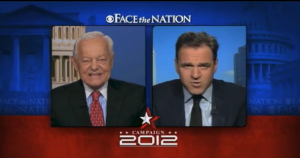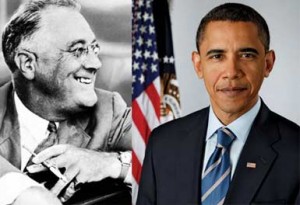I trust my commentaries make it plain that I am far too cynical (aka informed) to be disappointed by anything in American politics. And nothing justifies my cynicism quite like the way political debates and election campaigns have been reduced to little more than hurling partisan talking points that have no regard for objective facts.
But just when I thought I could not become any more cynical comes Niall Ferguson’s partisan hit job on President Obama. He is an acclaimed professor of history at Harvard who has become a celebrity playing a political pundit on TV. But the perspective he brought to debates on issues of the day was at least informed by a coherent, even if misguided, political philosophy.
 This is why I was so shocked when he sounded on Sunday’s edition of Face the Nation on CBS like just another political hack. Specifically, he delivered a diatribe about “why we need a new president,” professing regret that, despite his best wishes, President Obama has failed to keep his campaign promises – especially on the economy and deficit. Never mind that his main points, which he belabors in the current issue of Newsweek, are readily belied by a comprehensive tally of all of Obama’s “promises made and promises kept” by Pulitzer Prize-winning PolitiFact.
This is why I was so shocked when he sounded on Sunday’s edition of Face the Nation on CBS like just another political hack. Specifically, he delivered a diatribe about “why we need a new president,” professing regret that, despite his best wishes, President Obama has failed to keep his campaign promises – especially on the economy and deficit. Never mind that his main points, which he belabors in the current issue of Newsweek, are readily belied by a comprehensive tally of all of Obama’s “promises made and promises kept” by Pulitzer Prize-winning PolitiFact.
Actually, Ferguson was so brazen in spinning data to support his partisan points that host Bob Schieffer felt compelled to interrupt to inform viewers that he Ferguson was in fact an adviser to Obama’s vanquished opponent in the 2008 presidential campaign, Republican Senator John McCain.
Appropriately enough, McCain has made a virtue out of self-deprecating jokes about being a sore loser. But there was no hint of self-deprecation or humor in the way Ferguson was licking his political wounds on TV for all to see.
But, as referenced above, PolitiFact is the most authoritative source for anyone interested in determining whether Obama has fulfilled enough campaign promises to earn re-election. Therefore, I shall suffice to share the following for anyone who might have been impressed by the professor’s seemingly authoritative critique of Obama to consider:
 Surveys of academic historians and political scientists have routinely ranked Franklin Delano Roosevelt second only to Abraham Lincoln on lists of the most successful presidents in U.S. history. No doubt historian Ferguson knows that Obama made the same promises in 2008 that FDR made in 1932 when he was campaigning for his first term, namely, to improve the economy and balance the budget. The only difference is that FDR was dealing with an economy in the death throes of the Great Depression; whereas Obama was dealing with one in the death throes of the worst recession since that Great Depression.
Surveys of academic historians and political scientists have routinely ranked Franklin Delano Roosevelt second only to Abraham Lincoln on lists of the most successful presidents in U.S. history. No doubt historian Ferguson knows that Obama made the same promises in 2008 that FDR made in 1932 when he was campaigning for his first term, namely, to improve the economy and balance the budget. The only difference is that FDR was dealing with an economy in the death throes of the Great Depression; whereas Obama was dealing with one in the death throes of the worst recession since that Great Depression.
Of course, any high-school student knows that FDR wasted no time breaking both promises by championing his New Deal initiatives. Why? Because FDR realized that government action (i.e., spending) was the only way to resuscitate the economy. And there’s no gainsaying the lasting success of his initiatives. Which is why it’s hardly surprising that Obama attempted to champion similar initiatives – highlighted by his Stimulus Package.
Except that many of Obama’s initiatives were undermined or thwarted by Republican obstructionists the likes of which Democrat FDR could never have even imagined. And, based primarily on the extent to which they have obstructed his efforts to improve the economy and balance the budget, these short-sighted, idiot Republicans are now proudly proclaiming Obama a failed president. But Ferguson should know better….
 Anyway, like Obama’s critics today, FDR’s critics back then accused him of betraying American values (of capitalism and rugged individualism) and fostering interest-group politics (by courting the likes of working-class Whites, union members, immigrants, and Jews). More to the point, it follows from his diatribe that Ferguson would have been in the vanguard of critics calling on FDR to “Hit the Road” after only one term – just as he’s calling on Obama to do today.
Anyway, like Obama’s critics today, FDR’s critics back then accused him of betraying American values (of capitalism and rugged individualism) and fostering interest-group politics (by courting the likes of working-class Whites, union members, immigrants, and Jews). More to the point, it follows from his diatribe that Ferguson would have been in the vanguard of critics calling on FDR to “Hit the Road” after only one term – just as he’s calling on Obama to do today.
 Well, we all know how reliable and informed FDR’s critics turned out to be. Which is why it is so stupefying that this (erstwhile) eminent historian is condemning himself by repeating their notorious mistakes.
Well, we all know how reliable and informed FDR’s critics turned out to be. Which is why it is so stupefying that this (erstwhile) eminent historian is condemning himself by repeating their notorious mistakes.
But it’s one thing for me to impeach Ferguson’s ill-advised foray into political punditry in this fashion. It’s quite another for no less a person than Nobel Prize-winning (Princeton) economist Paul Krugman to do so by decrying his “unethical commentary” in Newsweek as riddled with “multiple errors and misrepresentations.”
What’s more, Krugman was being kind. For here is how another of Ferguson’s peers, Professor Brad DeLong – economics professor at the University of California at Berkeley, reacted:
Fire his ass. Fire his ass from Newsweek, and the Daily Beast. Convene a committee at Harvard to examine whether he has the moral character to teach at a university. There is a limit, somewhere. And Ferguson has just gone beyond it.
(Huffington Post, August 20, 2012)
With that, it is probably best for me to leave it to his fellow professors to sort Ferguson out.
I will only add that his hit job actually makes me regret that the Constitution prevents Obama from fully emulating FDR by being elected to three consecutive terms. All the same, I have no doubt that this president who, among other things, championed universal healthcare and vanquished al-Qaeda – the most serious foreign threat to America since the Nazis, will be ranked by (objective) historians right up there with FDR as one of the most successful presidents in U.S. history.
NOTE: A colleague found Ferguson’s commentary so unhinged he speculated that, like so much of the criticisms of Obama, it must be racially motived. I hastened to disagree. I offered that I’ve read enough of his published works to believe that Ferguson’s criticisms derive far more from his academic aversion to the Keynesian policies Obama favors than from anything having to do with his race. I addressed the philosophical differences between them in this respect in Rational Markets vs. Keynesian Economics (September 23, 2010).
Related commentaries:
Rational Markets vs…